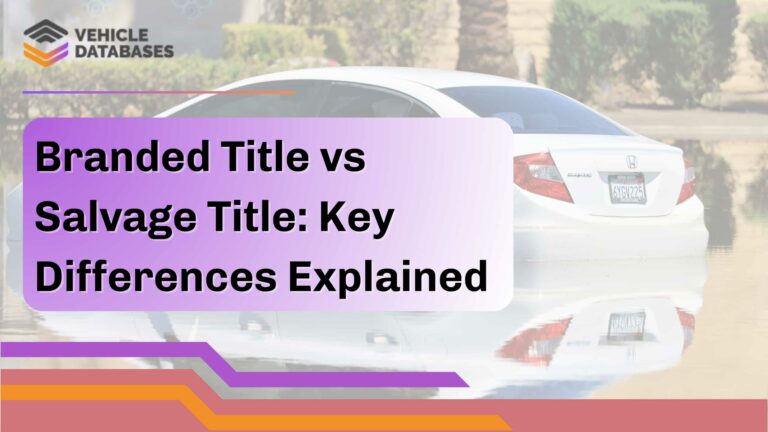Buying a used car can feel like a gamble, especially when you don’t know the vehicle history. No one wants to deal with unexpected accidents, hidden damage, or a vehicle that’s been in a flood. That’s where vehicle history reports are crucial—they give you a look into the car’s past, helping you make an informed decision.
But when it comes to choosing between Carfax and AutoCheck, it’s easy to get lost. Both offer valuable insights, but which is better? Whether you’re a car buyer or an auto business looking to provide these reports, understanding the difference is crucial.
Moreover, if your business is planning to build a vehicle history service, integrating a reliable vehicle data API could set you apart from the competition. Let’s break down how Carfax and AutoCheck compare and explore other alternatives that might suit your needs.
RELATED: How Does Carfax Get Its Information: The Most Transparent Answer
Autocheck vs. Carfax: What Is the Most Accurate Vehicle History Report?
Both Carfax and AutoCheck are designed to provide in-depth vehicle history reports, but their sources of information differ, which impacts their accuracy and detail.
Carfax sources data from over 100,000 service shops, dealerships, insurance companies, and rental agencies. This wide net helps Carfax generate detailed reports that cover maintenance records, ownership history, accidents, and even small incidents like minor damage reports.
AutoCheck, on the other hand, focuses heavily on auction data and DMV records. For many professionals in the auto industry, this auction-centric focus is a goldmine, especially if you’re dealing with cars that have passed through multiple auctions. AutoCheck also has a unique feature: its “AutoCheck Score.” This score quickly summarizes the vehicle’s condition by assigning a number based on factors like accident history and the number of previous owners.
So, which one is more accurate? If you’re looking for extensive maintenance records and a broad range of data sources, Carfax has the upper hand. But if auction history and a clean, easy-to-read summary are important to you, AutoCheck might suit your needs better.
In reality, neither is 100% perfect, which is why many savvy buyers check both to get the full picture.
Check out the unique features of each to determine the best options for your needs:
RELATED: How Accurate is Carfax? Examining Carfax Report Accuracy
Carfax
$44.99
|
❌ Sales listing with photos |
|
❌ Auction records with photos |
|
✔️ Market value data |
|
— Detailed vehicle specifications (Limited) |
|
❌ Window stickers |
|
❌ Support for classic vehicles |
|
✔️ Maintenance recommendation |
|
✔️ Ownership history |
|
✔️ Accident history |
|
✔️ Damage check |
|
✔️ Branded title check |
|
✔️ Salvage title check |
|
❌ Ownership history map |
|
✔️ Recalls |
|
❌ Supports for heavy duty trucks, ATVs, trailers & motorcycles |
|
— Mobile & desktop applications (Limited) |
Detailed Vehicle History
$19.99
|
✔️ Sales listing with photos |
|
✔️ Auction records with photos |
|
✔️ Market value data |
|
✔️ Detailed vehicle specifications |
|
✔️ Window stickers |
|
✔️ Support for classic vehicles |
|
✔️ Maintenance recommendation |
|
✔️ Ownership history |
|
✔️ Accident history |
|
✔️ Damage check |
|
✔️ Branded title check |
|
✔️ Salvage title check |
|
✔️ Ownership history map |
|
✔️ Recalls |
|
✔️ Supports for heavy-duty trucks, ATVs, trailers & motorcycles |
|
✔️ Mobile & desktop applications |
AutoCheck
$29.99
|
❌ Sales listing with photos |
|
❌ Auction records with photos |
|
✔️ Market value data |
|
— Detailed vehicle specifications (Limited) |
|
❌ Window stickers |
|
❌ Support for classic vehicles |
|
❌ Maintenance recommendation |
|
✔️ Ownership history |
|
✔️ Accident history |
|
✔️ Damage check |
|
✔️ Branded title check |
|
✔️ Salvage title check |
|
❌ Ownership history map |
|
✔️ Recalls |
|
❌ Supports for heavy-duty trucks, ATVs, trailers & motorcycles |
|
❌ Mobile & desktop applications |
Does Carfax Show More Records than AutoCheck?
In terms of raw data, Carfax tends to show more than AutoCheck when it comes to maintenance and repair history. This is due to Carfax’s partnerships with service centers and dealerships, allowing it to capture more information on routine services like oil changes, brake jobs, and tire rotations. This level of detail is important for anyone wanting to know how well the previous owner cared for the car.
However, AutoCheck excels in areas where Carfax may not go as deep. For instance, AutoCheck is a great choice for spotting title issues, especially those related to vehicles sold at auctions. Title washing, a practice where a car’s title is altered to hide damage or salvage history, is something AutoCheck is particularly good at detecting. If the vehicle has passed multiple auctions, AutoCheck will give you a clearer view of those transactions.
If you want to know every single time a vehicle is in the shop, Carfax is your best bet. But if you’re worried about potential title issues or auction history, AutoCheck could be the more helpful option. Both services offer a good overview, but they shine in different areas depending on what information you prioritize.
Build a Vehicle Report App From Scratch with a VIN Decoding API
Have you ever considered creating your own vehicle history report app or tool? The growing demand for vehicle transparency has created a booming market for applications like Carfax and AutoCheck. However, building an app from scratch can be a complex task. This is where APIs come into play—they allow you to access and integrate vehicle data directly into your platform without having to manage the complexities of data collection yourself.
A service like the VIN Decoder API allows businesses to offer vehicle history checks, VIN lookups, and detailed reports quickly and easily. With an API, you can pull up information based on the VIN and instantly provide details like the make, model, year, engine type, and vehicle history. If you’ve ever wanted to build a Carfax-style tool, the right VIN decoder API will help you get there without the hassle.
APIs are scalable, reliable, and customizable. Whether you’re running a dealership, a repair shop, or an app that provides vehicle reports, integrating a VIN decoder API can offer tremendous value to your users. And if you’re focused on expanding your business offerings, using an API from a trusted provider like Vehicle Databases ensures that you deliver accurate and up-to-date information to your customers.
Other Alternatives to Carfax and AutoCheck
Carfax and AutoCheck aren’t your only options when it comes to vehicle history reports. There are several other platforms that offer unique features and might be a better fit for certain users or businesses. Here are some alternatives to consider:
Detailed Vehicle History
Detailed Vehicle History provides a thorough breakdown of a car’s past, similar to Carfax and AutoCheck, but with added features like the ability to provide a window sticker service and more vehicle history records.
With Detailed Vehicle History, you can expect:
-
Accurate auctions and sales history
-
Title brand records
-
Theft records
-
Title brand records
-
Odometer rollback
-
Previous owners and locations, and more.
These stickers list the car’s original equipment, trim packages, and manufacturer information. This can be a valuable feature for dealerships looking to add credibility to their listings.
Classic Decoder
Standard VIN decoders often fall short for businesses or individuals working with classic cars. Classic cars, particularly those manufactured before 1981, have VINs that are shorter than today’s 17-digit format.
Classic Decoder specializes in decoding these older VINs, which typically range from 5 to 14 digits, and is the exclusive provider of this service currently. It is an essential tool for anyone dealing with vintage or antique vehicles, whether you’re restoring a classic car or verifying the authenticity of a rare vehicle.
They also provide free classic VIN decoding and build sheets that show classic build data, which neither Carfax nor AutoCheck offers.
VinAudit
VinAudit is a cost-effective alternative to Carfax and AutoCheck. While it might not offer the depth of data you’d get from Carfax, it’s great for users who need basic information like accident history, salvage title checks, and odometer readings. This makes VinAudit a good option for small dealerships or buyers on a budget.
EpicVIN
EpicVIN is another budget-friendly option that focuses on insurance and DMV data. It’s a solid alternative for tracking accidents, title issues, and registration history. EpicVIN also offers a clean, user-friendly interface that makes it easy to pull up reports quickly. While not as comprehensive as Carfax, it provides essential data for a fraction of the cost.
CarVertical
CarVertical takes things further by using blockchain technology to verify vehicle history data. This extra layer of security ensures that the data you’re getting hasn’t been tampered with, making CarVertical an excellent choice for users who want transparency and security in their vehicle history reports.
The platform also gathers data from multiple countries, which is helpful for dealing with imported vehicles. CarVertical’s use of blockchain technology gives it a unique edge in the vehicle history report market.
RELATED: Do insurance companies automatically report to Carfax?
Conclusion
Choosing between Carfax and AutoCheck depends on your specific needs. Carfax excels at providing detailed maintenance and service records, while AutoCheck stands out for its auction history and title-related insights.
If you’re a business looking to offer vehicle history reports or VIN lookups, you can build your platform using a VIN Decoder API, which provides the flexibility and scalability you need to compete with established players like Carfax and AutoCheck.
But don’t stop there—explore other alternatives like Detailed Vehicle History, Classic Decoder, VinAudit, EpicVIN, and CarVertical. Each offers something unique, whether you need to decode classic VINs or provide blockchain-backed reports. Having multiple tools at your disposal can help you provide your customers with the most accurate and reliable vehicle information.
With the right API and a solid understanding of the market, you can build a tool that matches Carfax and AutoCheck and might even surpass them in certain areas.
Frequently Asked Questions
Which is more accurate, AutoCheck or Carfax?
Both services are reliable. Carfax partners with a large network of dealerships and service centers to provide detailed vehicle history reports. AutoCheck, while a newer name in the industry, also offers comprehensive reports from a wide range of sources and is often available at a slightly more affordable price.
What is the best site to check car history?
It depends on what you need. Carfax and AutoCheck are popular, but Detailed Vehicle History is a great choice if you want extras like auction images, classic car info, window stickers, and more.
Is AutoCheck free?
No, AutoCheck isn’t free. You usually have to pay for a single report or buy a package if you’re checking multiple vehicles.
Is AutoCheck as good as Carfax?
AutoCheck is a strong alternative to Carfax, especially for tracking auction and title history, but Carfax often provides more detailed service and maintenance records.
Does Autocheck show service history?
AutoCheck may show some service history, but it’s typically not as comprehensive or consistent as what Detailed Vehicle History provides.




